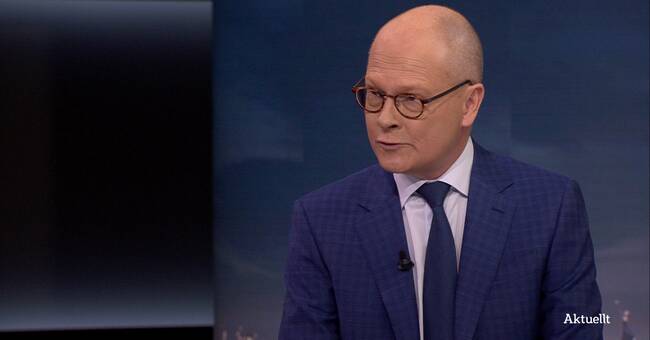The Left Party's party leader Jonas Sjöstedt had skilfully steered the preliminary talk ahead of Sunday's party leader debate to deal with his demand for a declaration of no confidence in Prime Minister Stefan Löfven.
Sjöstedt's ultimatum was that during the debate, the Prime Minister would withdraw the controversial inquiry proposal on labor law.
When both the Moderates and the Christian Democrats stated that they were prepared to support such a declaration of no confidence, it was thus about to become a sharp situation in the government issue.
Jonas Sjöstedt had maneuvered his way to a leading role in this his last TV debate as party leader.
There will be no government crisis
But despite the fact that Sjöstedt did not get the message from Löfven that he demanded, he chose in the debate to press the pause button.
There will be no government crisis.
At least not now.
Possibly the pressure on Sjöstedt has become too strong in recent days.
After all, a no-confidence motion against Löfven could pave the way for M-leader Ulf Kristersson as prime minister.
And that is probably not what the legacy Sjöstedt intended when he leaves the post as party leader for the Left Party in a few weeks.
At the same time, it is not excluded that the social partners will make a new attempt to reach an agreement.
The formerly so belligerent Sjöstedt thus chose to turn down the level of conflict, instead of taking seriously the threat he has been talking about for so long.
When Ebba Busch offered him the mandates he needed to formally raise the issue of a no-confidence vote, Sjöstedt replied that he was prepared to give Löfven and the government "a few more weeks".
For Stefan Löfven, Sjöstedt's message in the debate means that the acute threat of a government crisis has been removed.
Of course, such a threat can of course be brought up again, but the crucial question is still whether Jonas Sjöstedt is prepared to go into a sharp position.
Some will doubt after Sunday's debate.
The question is even whether Sjöstedt himself will be involved when this is decided.
Instead, it could be his successor, probably Nooshi Dadgostar, who gets to take over the issue.
The change of party leader in the Left Party will take place the last weekend in October, just a few days after the consultation round of the controversial Las investigation is completed.
The reading question is a problem for Stefan Löfven
Regardless, the issue of labor law and the Las issue is a problem for Stefan Löfven.
Within the trade union movement and his own party, there is strong criticism of the investigation proposal that has been presented.
Löfven's line in the debate was therefore that the social partners must be given a chance to reach an agreement on, among other things, the rules of priority.
If this is not possible, Löfven and the Social Democrats want to change parts of the investigation proposal.
The purpose is, according to Löfven, to maintain the "balance" between unions and employers.
What this may mean in practice, however, is unclear.
The Social Democrats have a completely different view of labor law than, for example, the Center Party and the Liberals.
If the parties in the labor market fail to reach a settlement and the issue will ultimately be decided by the January parties, there will therefore be tough negotiations.
The January agreement states both that the inquiry's proposal will be implemented in that case and that the balance in the labor market will be maintained.
This paves the way for interpretation difficulties and a continuing conflict between the January parties over labor law.

